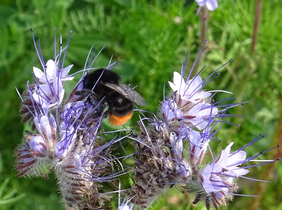To protect insects, farmers in Baden-Württemberg create flowering areas by sowing special flowering mixtures. These flower-rich stands are intended to provide food for insects and serve as reproduction and refuge areas. In the course of the current evaluation of the Baden-Württemberg Rural Development Programme (MEPL III), the IfLS already carried out an evaluation of annual flowering areas in 2018-2019. From 2020 to 2021, a second field investigation took place, which also took into account perennial and perennial flowering areas.
For this purpose, almost 60 annual, perennial and perennial flowering areas that were established within the framework of the Agri-environmental, Climate Protection and Animal Welfare Support Programme (FAKT), as well as fallow land and rapeseed/legumes as comparison areas, were examined a total of three times. In addition to the range of flowers offered by these areas during the course of the year, wild bees, hoverflies and butterflies were recorded. The abundance of individuals and species of these flower-visiting insects is an important criterion for evaluating the FAKT flowering areas.
The study was supported by the University of Freiburg, which made the field surveys possible, among other things, through a thesis.
After a summary evaluation of the work and a discussion of recommendations, a report on the results was published.
Project no.: | 205 |
Categories: | Evaluation | Sustainable land use | |
Client: | Ministry of Food, Rural Areas and Consumer Protection Baden-Wuerttemberg (MLR) |
Executing Organization: | Institut für Ländliche Strukturforschung e.V. |
Duration: | 2020-2021 |
Contact person/s at IfLS: | Heike Nitsch und Jörg Schramek |
Project management: | Heike Nitsch, Jörg Schramek und Nele Stackelberg |
